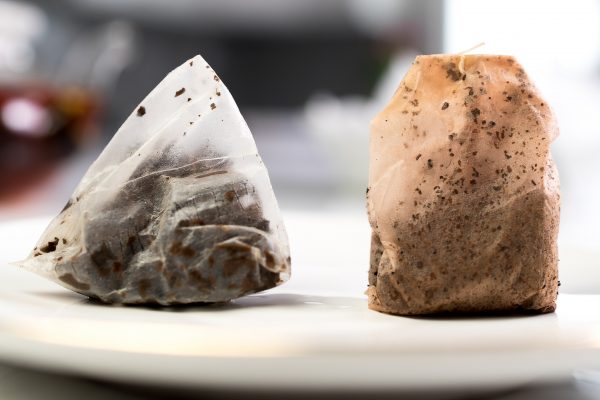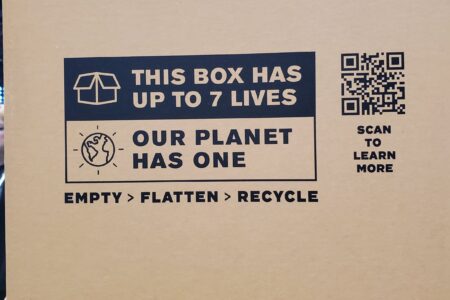Plastic Free Tea Bags Remain a Concern, But Are the Solutions Really Socially Responsible?

I was in England earlier this month for Tea & Coffee World Cup, which took place in Birmingham (3-5 September). Although I was there for business, I did have a few free hours, including the day I landed. Surprisingly, I was able to buy last-minute tickets to visit the State Rooms at Buckingham Palace — in my many visits to London, this was the first time I was there when the palace was open to visitors. After the tour, which was absolutely fascinating, I stopped by the Buckingham Palace Café for a much-needed coffee, which was unfortunately, awful. While on line waiting to order and pay, I began talking to two gentleman – one from New Zealand, the other from Essex, England – so we sat together. After ordering tea, they proceeded to remove the plastic lids off the cups of hot water, insert the tea bags and then replace the lids. After letting the tea steep for a couple of minutes, they begin drinking. Both left the tea bag in their cups the entire time we chatted. Neither liked the taste of the tea, which I believe was English Breakfast.
As I watched the tea bags remain in both cups, I thought about how plastic in tea bags has become quite an issue this year, but more so in the United Kingdom than in North America. In its 2018 Tea Report, Tetley revealed that one in five consumers are drinking more tea than they did a year ago. According to the UK Tea and Infusions Association, British consumers drink 60.2 billion cups of tea every year, 96% of which are brewed using tea bags. Many of the most popular British tea-bag brands reportedly use a sealing plastic called polypropylene to fasten the tea bags and retain their shape.
The subject of plastic-free packaging for food and beverages has become of greater interest to British consumers following Sir David Attenborough’s program, Blue Planet II, a 2017 British nature documentary series on marine life that showed how much plastic is in the world’s oceans and seas, and the damage it is causing (its predecessor, Blue Planet, debuted in 2001).
“There has been a wave of interest from both the consumers and the press in plastic free, with many companies scrambling to become plastic free by 2020,” said Andy Byron, sales and trade marketing executive for Brentford, England-based Teapigs, in “Demand for Plastic Free Tea Bags Affects Packaging Changes,” by Anne-Marie Hardie, which appears in the July/August 2018 issue of Tea & Coffee Trade Journal.
The concern surrounding the harm that plastic is doing to the planet is real (I’m sure most of us have seen videos of turtles, dolphins and fish ensnared in the plastic rings found on six-packs of soda cans). However, whether plastic in tea bags is negatively affecting our health, remains to be seen. Some say the UK is over-reacting as the amount of plastic traditionally used in tea bags is minimal. The main components of tea bags are constructed of natural fibers – the plastic is used to thermally seal the bag – and filter papers adhere to all food regulations. “The concern over plastic in teabags is completely unfounded. Tea has never posed a health risk to consumers. Tea is a healthy beverage and messages like this do a great disservice to a product that does us good,” Shabnam Weber, the new president of the Tea and Herbal Association of Canada, told T&CTJ in a Q&A that appears in the September issue.
In her presentation, World Tea Trends, at Tea & Coffee World Cup, Jane Pettigrew, well-known author, tea expert and the director of studies at the UK Tea Academy, said that for some time now pyramid gauze tea bags have been available and have been promoted as ‘bio-degradable.’ However, she explained that, they are not “unless they are treated at very high temperatures. So, these do not break down in garden composters or council landfill sites.”
Many companies are now promoting PLA for cups and for tea papers. PLA – polylactide or polylactic acid – is a resin made from the carbon stored in plants by photosynthesis in the form of dextrose sugar. (The carbon and other elements in these sugars are then used to make a biopolymer through a process of fermentation and separation. The resulting resin is called PLA.) Pettigrew explained that although companies that use PLA claim it’s biodegradable — it apparently is not.
Quoting Biosphere Plastic, Pettigrew said, “PLA is not biodegradable, it is degradable. Enzymes which hydrolyze PLA are not available in the environment except on very rare occasions.”
She concluded by saying, “I’m afraid it’s still a case of ‘watch this space’ when it comes to biodegradable materials for take away cups and tea bags.”
I agree that it is a case of ‘watch this space.’ It seems that for now, at least, we will all have to wait to see what happens next when it comes to plastic-free tea bag solutions.




This is very clearly a case of protecting the vested interests of large multinationals who want to protect their brands and markets. The solution to this is simply to promote the use of loose leaf teas. It is ridiculous that we continue to drink tea in little bags which have been processed in factories. We cook food and eat it on the go.. We should be able to brew tea and drink it on the go.. Ie the argument that we need tea bags in our lives (convenience etc) is one that needs to be challenged.
This is the hard part due to the fact that large tea companies see no benefit for themselves. Lower margins, fewer opportunities to differentiate are two key obstacles . That is the inconvenient truth. It means the change will be consumer driven… 😀 The move towards clean eating will be one reason for this change! After 35 years of being in the wholesale tea business I can count on one hand the times I’ve been forced to drink tea that has been brewed in a bag. We’ve been drinking tea for 1000’s of years and don’t need a wretched piece of paper to brew our favourite tea in!
Sounds like a good idea!
Well this is news to me.I.only found out yesterday.I will just buy loose tea and a tea pot. I’m mostly a coffee drinker anyway.really just didn’t think how a tea bag was sealed or held togeather in hot water.Once again the old ways were better… Tea bags were invented for our convenience….
I have been reading a lot about this yesterday and today. Regarding the use of tea bags and whether or not they contain dangerous amounts of plastic, I’m sure it will become a personal decision for each individual. Being an American who is the daughter of a British mother, I learned to drink tea at a very early age , and even now would rather drink tea than coffee. And since I abhor plastic in any form, for any use whatsoever, I think it is a small price to pay to buy organic bulk tea in several flavors at one of the local health food stores. I’m sure the tea companies are not intentionally trying to hurt us with their plastic, but why take a chance anyway? I am 70, and who says you can’t teach an old dog new tricks? This old dog doesn’t need any more coaxing. Goodbye, tea bags!
As a British born South Asian lady who is from a family of ‘teaoholics’ I am beginning to move away from Tea Bags, I have been using some nice loose tea for approximately months now. I still use a tea bag as it’s the convenience which is the reason most of us went over to tea bags, less mess no need for a sieve of any kind and all that… I’ve been reading about plastic in tea bags and I’m afraid it’s very off putting.
After finding out my mum narrowed down a strange but very very uncomfortable rash that suddenly began a few yrs ago in 2016, my sr took her wherever she could to find out what this rash was. Turns out that when my coffee drinking sr would make a cuppa she’d always make mum a coffee too. So when mum had an operation for a knee replacement she was ‘subjected’ is how my used to describe it, to my sr and her coffee. It’s only then that my mum who’s a fluent English speaking lady around the age of 62 at the time realised her rash had stopped and narrowed it down to the tea she was drinking all this time.
She now only drinks coffee and is fine.
I have gone over to drinking coffee over tea but i too found that I would get really bad stomach cramps when I ate bananas which were until then my favourite fruit.
I’ve been trying over the years to see if the problem would stop and as I’ve been drinking far more coffee this year, I am able to eat my favourite fruit but if I drink more tea then I can tell theres an issue. I’m ok with loose tea which I’ve only been drinking more of for approximately 6mths now.
It may just be a coincidence but I dont know. I’m fairly convinced it’s the plastic in our brew.
Loose tea for me and hubby, we’ve even been out and bought a tea pot with a loose tea holder in the top so that we don’t need a sieve for the tea. The rest is yummy delicious tea. I make it at least once a day and it tastes far far better than tea bag tea.
Hey I never know that PLA is not biodegradable. Seems like I have to be careful with this from now on.